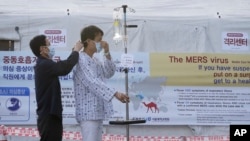Concerns over a dangerous respiratory illness have led South Korean health authorities to isolate more than 680 people who may have been exposed. China and Hong Kong also are taking steps to halt the spread of MERS, or Middle East Respiratory Syndrome, which has killed hundreds of people in that region since its emergence in 2012.
As of Monday, South Korea had reported at least 17 confirmed cases, the largest outbreak outside of the Middle East.
Hong Kong also has quarantined 18 people and isolated 17 more. And China’s Guangdong province, with one confirmed case of MERS, has isolated nearly 80 people.
The MERS virus initially produces flu-like symptoms such as fever and coughing, though these can escalate to pneumonia and kidney failure. Among confirmed cases globally, at least four out of 10 people have died, according to the World Health Organization. There is no vaccine or treatment for the disease, which first was reported in Saudi Arabia but later traced to Jordan, according to the U.S. Centers for Disease Control.
The disease spreads through close contact, the CDC’s website says.
Hundreds isolated
As a precaution, South Korea has isolated 682 people at their homes or in state-run facilities, said Kwon Jun-wook, the health and welfare ministry’s director of public health policy. He said the country had experienced no fatalities, though at least one patient was very ill.
South Korea reported its first case in May after diagnosing a 68-year-old man who’d returned to Seoul from a trip to Bahrain, Saudi Arabia and the United Arab Emirates. Authorities have identified him only as Patient 1.
All of the subsequent cases reported so far have been linked to direct contact with that patient, according to South Korea’s health ministry. They were either medical personnel involved in his care or patients exposed to the man before his diagnosis.
Outbreak response criticized
South Korea has come under some criticism for its handling of the outbreak’s early stages.
Patient 1 went to four hospitals before he was diagnosed with MERS. At least 10 other Koreans diagnosed with the illness came in contact with him at the second hospital where he sought treatment, said Kim Woo-joo, a professor of infectious diseases at Korea University who’s now working with the health ministry to contain the outbreak.
Kim said that most of those exposed were in the same room or on the same floor as Patient 1 and that two doctors were not wearing proper protective clothing.
Also, South Korea did not make the quarantine restrictions mandatory. And some people exposed to MERS reportedly refused to remain in voluntary isolation.
In China, a 44-year-old South Korean businessman diagnosed with MERS in Guangdong reportedly had been exposed to Patient No. 1 in Seoul. He’d begun to feel ill but, against doctor’s orders, nonetheless travelled to China through Hong Kong.
China and Hong Kong subsequently imposed quarantines. China isolated the traveler at a hospital, the Associated Press reported, adding that Hong Kong authorities on Sunday said the 18 people who’d sat near him and were quarantined have shown no symptoms.
South Korean authorities say this week will be critical to see if they have contained the outbreak by preventing third-level exposure, the spread of the disease to a person who did not have direct contact with the first infected patient.
VOA producer Youmi Kim contributed to this report from Seoul.













